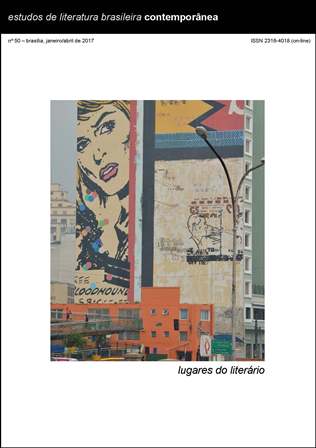El beso de la mujer araña:
gênero, sexualidade e subversão
DOI:
https://doi.org/10.1590/2316-40185024Abstract
Este trabalho pretende realizar uma leitura crítica do romance El beso de la mujer araña (1976), escrito pelo argentino Manuel Puig, a partir de uma perspectiva que questiona os arranjos e as representações de gênero e sexualidade dentro do universo diegético da narrativa. É a partir das categorias de focalização, cunhada por Mieke Bal, e de performatividade, elaborada no campo dos estudos feministas por Judith Butler, que se pretende sustentar a leitura desse romance como uma alegoria política da economia do corpo, do gênero e dos afetos, sustentáculos para a proposta de uma ética da alteridade como alternativa aos valores patriarcais e heteronormativos que subordinam as possibilidades identitárias de gênero e de expressão do desejo sexual.
References
ALÓS, Anselmo Peres (2002). O eu, o outro e a ética da alteridade: um diálogo intertextual entre Fernando Pessoa e Caio Fernando Abreu. Caligrama: revista de estudos românicos, Belo Horizonte, v. 7, p. 23-38, jul. Disponível em: <https://goo.gl/p5UzXu.> Acesso em: 31 ago. 2012.
ALÓS, Anselmo Peres (2009). Heterotopias do desssossego: literatura e subversão sexual na América Latina. Cerrados, Brasília, v. 27, p. 231-249. Disponível em: <https://goo.gl/pQJApo.> Acesso em: 20 ago. 2012.
ALÓS, Anselmo Peres (2010). Narrativas da sexualidade: pressupostos para uma poética queer. Estudos feministas, Florianópolis, v. 18, n. 3, p. 837-864. Disponível em: <https://goo.gl/CYCfgB.> Acesso em: 20 de julho de 2012.
ALÓS, Anselmo Peres (2011a). Gênero, epistemologia e performatividade: estratégias pedagógicas de subversão. Estudos feministas, Florianópolis, v. 19, n. 2, p. 421-449. Disponível em: <https://goo.gl/uOY0HO.> Acesso em: 1º jul. 2012.
ALÓS, Anselmo Peres (2011b). Prolegomena queer: gênero e sexualidade nos estudos literários. Cadernos de letras da UFF, Niterói, n. 42, p. 199-217. Disponível em: <https://goo.gl/dGRZfs.> Acesso em: 20 ago. 2012.
ALÓS, Anselmo Peres (2013). A letra, o corpo e o desejo: masculinidades subversivas no romance latino-americano contemporâneo. Florianópolis: Mulheres.
BAKHTIN, Mikhail (1993). A cultura popular na Idade Média e no Renascimento: o contexto de François Rabelais. Tradução de Yara Frateschi Vieira. São Paulo: Hucitec; Brasília: UnB.
BAKHTIN, Mikhail (1997). Marxismo e filosofia da linguagem. 8. ed. Tradução de Michel Lahud e Yara F. Vieira. São Paulo: Hucitec.
BAKHTIN, Mikhail (1981). Problemas da poética de Dostoiévski. Tradução de Paulo Bezerra. Rio de Janeiro: Forense Universitária.
BAL, Mieke (Ed.) (2004). Narrative theory: critical concepts in literary and cultural studies. London: Routledge, 4 v.
BAL, Mieke (1997). Narratology. 2nd edition. Toronto: The University of Toronto Press.
BHABHA, Homi K. (1998). O local da cultura. Belo Horizonte: Editora da UFMG.
BOOTH, Wayne (1983). The rethoric of fiction. 2nd ed. Chicago: University of Chicago Press.
BRITZMAN, Deborah (1996). O que é esta coisa chamada amor: identidade homossexual, educação e currículo. Educação & realidade, Porto Alegre, v. 21, n. 1, p. 71-95, jan./jun.
BUTLER, Judith (1993). Bodies that matter: on the discursive limits of “sex”. London: Routledge.
BUTLER, Judith (1997a). Excitable speech: a politics of the performative. London: Routledge.
BUTLER, Judith (1997b). The psychic life of power. Stanford: Stanford University Press.
BUTLER, Judith (1999). Gender trouble. 10th anniversary edition. London: Routledge.
BUTLER, Judith (2001). Corpos que pesam. In: LOURO, Guacira Lopes (Org.). O corpo educado: pedagogias da sexualidade. 2. ed. Belo Horizonte: Autêntica, p. 151-172.
BUTLER, Judith (2003). Problemas de gênero. Tradução de Renato Aguiar. Rio de Janeiro: Civilização Brasileira.
CHATMAN, Seymour (1978). Story and discourse. Ithaca: Cornell UP.
CHATMAN, Seymour (1990). Coming to terms. Ithaca: Cornell UP.
DE LAURETIS, Teresa (1984). Alice doesn’t: feminism, semiotics, cinema. Bloomington: Indiana University Press.
DE LAURETIS, Teresa (1987). Tecnologies of gender. Bloomington: Indiana University Press.
FOUCAULT, Michel (1976). Histoire de la sexualité: la volonté de savoir. Paris: Gallimard.
GENETTE, Gérard (1972). Figures III. Paris: Seuil.
GENETTE, Gérard (1982). Palimpsestes: la littérature au second degrée. Paris: Seuil.
GENETTE, Gérard (1995). Discurso da narrativa. Lisboa: Vega.
GENETTE, Gérard (1998). Nuevo discurso del relato. Madrid: Cátedra.
GENETTE, Gérard (2004). Métalepse, de la figure à la fiction. Paris: Seuil.
HARAWAY, Donna (2000). Manifesto ciborgue: ciência, tecnologia e feminismo-socialista no final do século XX. In: SILVA, Tomás Tadeu da (Org.). Antropologia do ciborgue: as vertigens do pós-humano. Belo Horizonte: Autêntica, p. 37-130.
HUTCHEON, Linda (1991). Poética do pós-modernismo: história, teoria, ficção. Tradução de Ricardo Cruz. Rio de Janeiro: Imago.
KINDT, Tom; MÜLLER, Hans-Harald (2006). The implied reader: concept and controversy. Translated by Alaistar Mathews. New York: Walter de Gruyter.
KOZAK, Claudia (1991). Una política del género. Cuadernos Americanos: nueva época, Méjico, año 5, v. 1, n. 25, p. 163-81.
PUIG, Manuel (1976/1994). El beso de la mujer araña. New York: Vintage Español.
RICE-SAYRE, Laura (1989). Dominação e desejo: uma leitura materialista-feminista de O beijo da mulher-aranha de Manuel Puig. Ilha do Desterro, Florianópolis, n. 22, p. 13-28, 2º sem.
Downloads
Published
Issue
Section
License
Authors who publish in this journal agree to the following terms:
a) The authors maintain the copyright and grant the journal the right of first publication, the work being simultaneously licensed under the Creative Commons Attribution License-Non Commercial 4.0 which allows the sharing of the work with acknowledgment of the authorship of the work and publication this journal.
b) Authors are authorized to enter into additional contracts separately, for non-exclusive distribution of the version of the work published in this journal (eg publish in institutional repository or as a book chapter), with authorship recognition and publication in this journal.
c) Authors are allowed and encouraged to publish and distribute their work online (eg in institutional repositories or on their personal page) after the editorial process, as this can generate productive changes, as well as increase the impact and citation of published work (See The Effect of Free Access).
d) The authors of the approved works authorize the magazine to, after publication, transfer its content for reproduction in content crawlers, virtual libraries and the like.
e) The authors assume that the texts submitted to the publication are of their original creation, being fully responsible for their content in the event of possible opposition by third parties.


